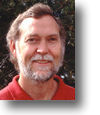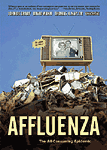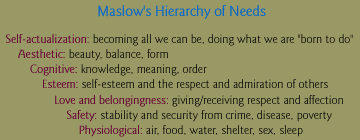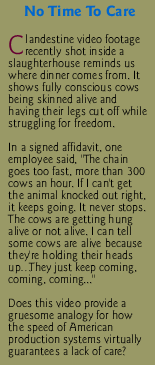| |
  |
|
|
By David
Wann
The only chance of satisfaction we can imagine is getting more of what we have now. But what we have now makes everybody dissatisfied. So what will more of it do - make us more satisfied, or more dissatisfied? - Psychologist Jeremy Seabrook More than ever, we have big houses and broken homes, high incomes and low morale, secured rights and diminished civility. We excel at making a living but often fail at making a life. We celebrate our prosperity but yearn for purpose. We cherish our freedoms but long for connection. In an age of plenty, we feel spiritual hunger. - Psychologist David Meyer It's like going into a room and forgetting what you came for, except in this case it's the whole culture, forgetting. We forget to ask, "What's an economy for?" En route to a brand
new American millennium, we got detoured. Price tags and bar codes began
to coat the surfaces of our lives, as every single activity became a
transaction. Eating, entertainment, socializing, health, even religion
- all became marketable commodities. To sleep or jumpstart sex, take
a pill. To eat, grab some fast food, or order "room service"
from a three-course, store-to-door caterer. To exercise, join a health
club. For fun, buy To live, we buy. Everything. (Except "free air" at the gas stations.) But many argue this way of life is not really working, and that it can't continue. You can withdraw only so much money from a trust fund (or fossil fuel and fossil water from underground). You get only so many miles out of a vehicle - even an expensive racecar. The American racecar lifestyle is fast approaching burnout because it requires long, stressful workweeks that eat up chunks of life, natural resources, and health. It programs us to substitute consumption for both citizenship and companionship. And it tries to meet non-material needs with material goods, despite the fact that many human needs can't be bought and sold. Game Over Psychologist Richard Ryan points to scores of studies - his own among them - showing that material wealth does not create happiness. "We keep looking outside ourselves for satisfactions that can only come from within," he explains. In the human species, happiness comes from achieving intrinsic goals like giving and receiving love. Extrinsic goals like monetary wealth, fame and appearance are surrogate goals, often pursued as people try to fill themselves up with 'outside-in' rewards. Says Ryan, "People with extrinsic goals sharpen
"We've documented that unhappiness and insecurity often initiate the quest for wealth," he continues. (Is this surprising, given other evidence that addiction often springs from childhood abuse?) In three studies with 140 adolescents, Ryan and colleague Tim Kasser showed that those with aspirations for wealth and fame were more depressed and had lower self-esteem than other adolescents whose aspirations centered on self-acceptance, family and friends, and community feeling. "The wealth-seekers also had a higher incidence of headaches, stomach aches, and runny noses," Ryan says. He believes that while people are born with intrinsic curiosity, self-motivation and playfulness, too often these qualities are squelched by "deadlines, regulations, threats, directives, pressured evaluations and imposed goals…" that come from external sources of control rather than self-motivated choices and goals. Curious about the origins of extrinsic goals, the psychologists looked at family influences. "When mothers were controlling and cold (based on perceptions of family and friends), individuals were more likely to base their self-worth and security on external sources like money." Their findings do not prove that rich people are always unhappy. Some are, some aren't. But they do point out that seeking extrinsic goals can dislodge us from vital connections with people, nature, and community - and that can make us unhappy. Dysfunctions and disconnects seem to detour everyone's life these days, rich and poor alike. Donella Meadows cuts to the heart of it in Beyond the Limits: "People don't need enormous cars, they need respect. They don't need closets full of clothes, they need to feel attractive and they need excitement and variety and beauty. People don't need electronic equipment; they need something worthwhile to do with their lives. People need identity, community, challenge, acknowledgement, love, and joy. To try to fill these needs with material things is to set up an unquenchable appetite for false solutions to real and never-satisfied problems. The
Opinion polls reveal that Americans crave reconnection with the real sources of satisfaction, but we can't find our way back among all the jingles, static, broken gadgets, and credit card bills. We adopt a pattern clinically proven to lower our resistance to affluenza when we ask, "How much?" rather than "How well?" The inevitable result can only be dissatisfaction, guaranteed. Quantity can't satisfy like quality can, and even an infinite supply of virtual reality will never actually be real. Your Money or Your Life The more real wealth we have - such as friends, skills, libraries, wilderness and afternoon naps - the less money we need, to be happy. Throughout history, many civilizations have already discovered this truth, as author Taichi Sakaiya describes in The Knowledge-Value Revolution. As the cedars of Lebanon and the topsoil of Northern Africa disappeared, human cultures learned to substitute knowledge, playfulness, ritual, and community for material goods. Their cultures became richer. "Circumstances had changed, and they moved away from a guiding principle that happiness comes from consuming more things... Working oneself into the ground simply to produce and consume more things was not the thing to do… The truly high-class lifestyle was one that allowed free time in which to enrich one's heart and soul - and this led to a groundswell of interest in religion. The people of the medieval era stressed the importance of loyalty to and faith in a communally held vision." During resource-scarce periods, the Japanese culture developed kenjutsu (fencing), jujitsu (martial arts), saka (tea ceremony and flower arrangement) go (Japanese "chess") and many other cultural refinements. Their culture became so highly evolved, according to Sakaiya, that the firearm was banned as too crude and destructive a method of settling differences. When humanist psychologist Abraham Maslow observed the Canadian Blackfoot Indian culture in the 1930s, he too found evidence that the concept of wealth is a social construct, based partly on instinct and partly on the strategic pursuit of such social laudable goals as equity, diversity, resourcefulness, and resilience. "The rich men of the tribe accumulated mounds of blankets, food, bundles of various sorts, and sometimes a case of Pepsi-Cola… I remember the Sun Dance ceremony in which one man strutted and, we would say, boasted of his achievements… And then, with a lordly gesture of great pride but without being humiliating, he gave his pile of wealth to the widows, to the orphaned children, and to the blind and diseased. At the end of the ceremony, he stood stripped of all possessions, owning nothing but the clothes he stood in.…" Maslow contends that this concept of wealth is based on higher values than material gratification. "It would seem that every human being comes at birth into society not as a lump of clay to be molded by society, but rather as a structure which society either suppresses or builds upon." Lower on the Hierarchy Everyone knows a few unique individuals - usually elderly - who are healthy, wise, playful, relaxed, spontaneous, generous, open-minded, and loving... people who focus on problems outside of themselves, and have a clear sense of what's authentic and what's not. They are people for whom life gets in the way of work, on purpose. For them, work is play, because they choose work they love. Psychologist Abraham Maslow termed these people "self-actualized" individuals. He placed a lot of faith in human potential to meet basic needs and then progress - under one's own guidance - up a hierarchy of needs towards fulfillment. Before he died, Maslow concluded that most Americans had met the basic physical and security needs, and had progressed to at least the "love and belongingness" rung of the hierarchy. Many individuals were higher on the hierarchy.
The question is, has America - weakened by affluenza - slipped down the hierarchy in the last 40 years? When Maslow wrote Motivation and Personality in 1957, Americans were happy and secure. The American Dream was as juicy as a ripe peach. But it seems like the rungs of Maslow's ladder have, since then, become coated with slippery oil, as in a cartoon. Sixty percent of us don't know our neighbors and seventeen percent move each year, so where can we find a sense of belonging? According to polls, we're more fearful now. We're more insecure about crime, the possible loss of our jobs and catastrophic illness. More than 50,000 Americans die every year from medical malpractice, making us all the more insecure about our health. How can we meet intrinsic community needs when roads and highways create distances between people? How can we feel a sense of beauty, security and balance if beautiful open spaces in our communities are being smothered by new shopping malls and rows of identical houses? (Sometimes the only way to find your new house is to push the "housefinder" button on your garage door opener, and watch which door opens). How can we feel satisfied with our work if it contributes to environmental destruction, social inequity and isolation from living things? (The highest incidence of heart attacks is on Monday morning - apparently some would rather die than go back to work.) Since becoming a nation of consumers spoon-fed by automated products, fewer of us are now able to use our hands, or a sense of craft, in our work. As a result, creative satisfaction gets lost in the shuffle, along with knowledge,
Psychologists, anthropologists, artists, and the distant voices in our own heads tell us that both the potential and the urgency exist for a new definition of wealth in America. If we enrich our own non-material sources of wealth, how much less money - and less work - will be necessary? If we "produce" our own entertainment, perhaps by learning to be musicians, master gardeners, or woodworkers, informed conversationalists, or sports participants rather than ticket-purchasing fans, we'll reduce our financial needs by at least 5 percent. If we provide some of our own transportation (and exercise) needs on foot - by living closer to work, stores, and recreation - we carve another 20 percent out of the $7,000 spent annually by the average car owner. Instead of working from January 1 to March 10 just to cover transportation costs, we can knock off in February. Good diet, satisfying work and regular exercise will keep our shopping carts free of side effects from expensive medicines we don't need, (as well as preventing some of the 30,000 deaths in America annually from reactions to prescription drugs). Cooking with healthy ingredients can make our taste buds, synapses, and white blood cells happy enough for us to raise our health insurance deductibles, and lower our premiums. Living in an energy-efficient home will shave another $300 off utility bills, and make our homes more comfortable. Changes like these are not about deprivation, but increases in the richness of our lives, and decreases in bills, stress, and waste. Quality satisfies more deeply than mere quantity. Maslow termed the basic physical needs deficiency needs, and assumed that as long as you ate, your food needs were being met. If you lived in a house or apartment (as opposed to the street), your shelter needs were being met, and so on. But his concept of deficiency didn't explore the quality of the food or shelter, and whether the needs were being supplied in a way that preserved the systems - the farms, forests and fisheries - they came from. Individual satisfaction ultimately banks on the stability
Maslow didn't consider sufficiency and the implications of over-consumption of the basic needs. Nor did he really get into efficiency in meeting needs - the technologies and pathways of production and use. If technologies are wasteful and destructive, they can't deliver overall satisfaction, because they pockmark Maslow's hierarchy like land mines. In our free market, waste itself has become an important product, and it's hard to feel proud of that. Furthermore, if loans and incentives offered by bankers, tax policy-makers, and regulators guide us towards wasteful designs and approaches, they too will frustrate our search for self-actualization. For those who haven't noticed it yet, the system is programmed for dissatisfaction! "May the Fork be With You" Even with its shortcomings, Maslow's hierarchy is widely used as a tool to explore personal and cultural growth. We use it here to look at how affluenza gets in the way of satisfaction. Imagine carrying a bulging sack of groceries from the supermarket to your car. What kind of value does the sack contain? What kind of health does the food provide? Between 1950 and 2000, America attained the lowest cost per unit of food in the world, as a percentage of income, but also the highest health care costs per capita. What's
In America, obesity is a greater health threat than starvation. Because the typical diet is too high in fats and sugars and too low in unrefined, slow-release carbohydrates, 71 percent of Americans are overweight by an average of ten pounds. An estimated 300,000 Americans die each year from unhealthy diets in combination with chronic inactivity. The GDP swells in proportion to our waistlines, since at least $150 billion is spent to control obesity and treat related diseases. While we continue to gorge, the contentsof our grocery sacks deliver diabetes, gallbladder disease, hypertension, cancer and higher risks of stroke. The weight-control and health care industries in particular grow large as America tries, unsuccessfully, to grow lean. Our grocery sacks are filled with brightly packaged frustration! We gulp fifty-three gallons of soft drinks every year, eat 250 fatty pounds of meat annually, and ingest 53 teaspoons of sugar every day. Much of our dietary
dissatisfaction arises from the lack of vitality processed food delivers.
The loss of control about food choice is also dissatisfying. Sugar is
a good example. In 1997, Americans consumed three-fourths more sugar
per capita than a hundred years ago, when most of the sugar produced
went directly into our homes. In those days, we prepared most of our
own meals, and Our high-protein diet is a prime example of meeting needs imprecisely. Livestock eat 70 percent of the grains produced in America, yet if humans ate more grains directly, it would be 7 to 8 times more efficient per pound. (Essentially, we wouldn't waste the grain's energy in the production of mountains of concentrated cow, hog, and chicken manure that pollute our waterways.) As Japan and China adopt a Western diet, previously rare Western diseases like arteriosclerosis and coronary heart disease come with it, explains health guru Andrew Weil. "Japanese women on traditional diets have one of the lowest rates of breast cancer in the world, but when they move to America and
Weil notes that there's far more to eating than the well-known consumer food groups (is that greasy, crunchy, sweet and salty?). Food has always been a medium of social activity, he explains. The word "companion" means literally "with bread." High quality food delivers satisfaction and contentedness, but low-quality food delivers poor health, irritability, pesticide residues, farm erosion, and the loss of rural communities as agribusiness giants take over. Junk food reduces our chances of reaching the top of Maslow's ladder, like a chute in the game Chutes and Ladders. Sadly, our excessive diet too often produces lethargic and hyperactive humans who lack the energy and motivation to climb back up. Is The Object Sex? Monetary wealth is not a prerequisite for self-actualization, but authentic, vital connections are. In our culture, sex is another physical need that sometimes becomes an obstacle, rather than stepping stone, to self-actualization. Because sex is so instinctively compelling, it's become one of affluenza's most virulent carriers. Sex sells. But like food, it's also a fundamental social bond. Writes Eric Fromm, "The experience of sharing keeps the relation between two individuals alive… Yet the sexual act - the prototype of shared enjoyment - is frequently so narcissistic, self-involved, and possessive that one can speak only of simultaneous, but not of shared pleasure." How much more self-involved can sex be than "cybersex," an emerging icon of isolation and unreality? "The affordability, accessibility and anonymity of the internet have spawned a new psychological disorder among men and women who seek sexual stimulation from their computers. Some of these addicts spend hours each day masturbating to online pornographic images or having online sex with someone they have never seen, heard, touched, felt, or smelled…." We might call cybersex gratification, but in no way can it be termed satisfaction. Woody Allen tells a joke about a mother who catches her son in the act of fantasy sex. "Don't do that, you'll go blind!" she screams. Expressing the essence of our addicted consumer culture in a single phrase, he pleads, "Can I do it until I need glasses?" Culture Crunch An old story about a native Pacific Islander rings true in the Age of Affluenza. A healthy, self-motivated native relaxes in a hammock that swings gently in front of his seaside hut, as he plays a wooden flute for his family and himself. For dinner, he picks exotic fruits and spears fresh sunfish. He feels glad, and lucky to be alive. (Think of it - he's on "vacation" most of the time!) Suddenly, without warning, affluenza invades the island. Writes Jerry Mander, "A businessman arrives, buys all the land, cuts down the trees and builds a factory. He hires the native to work in it for money so that someday the native can afford canned fruit and fish from the mainland, a nice cinderblock
Like Pacific Island natives, we've been cajoled into meeting most of our needs with products brought to us courtesy of multinational corporations - what you might call take-out satisfaction. "Almost every facet of American life has now been franchised," observes writer Eric Schlosser, "from the maternity ward at a Columbia/HCA hospital to an embalming room owned by the Houston-based Service Corporation International - which today handles the final remains of one of every nine Americans." What's good for America is good for the world - that's what the CEOs will tell you. One of the seven modern wonders of the world, the Golden Arches of McDonald's, now grace 25,000 restaurants in 114 countries, an empire upon which the sun never sets. A friend recently returned from China, where he observed a culture-clash beneath the Arches. "McDonald's missionaries spread the gospel of high-volume, low-cost fast food," he says, "but the Chinese don't really seem to want fast food - although they're intrigued with American burgers. They want to sit and leisurely drink tea. They don't get that they're supposed to be in a hurry. And they can't go out and sit in their cars to eat, because they came on their bikes." Now that the Great Wall is beginning to crack, can the Taj Mahal be far behind? Will India's sacred cow become the sacred burger? Nothing succeeds like excess! Culture-crunchers have already scored a huge victory in Spain, with a surgical procedure to remove the siesta. For a thousand years or more, the Spanish have enhanced their quality of life with a luxurious midday break that doesn't cost a single peseta. Yet in the eyes of commerce, siestas are a complete waste of time. What the world needs is more production, more consumption, less relaxation, and more money. Wake up, and get rich! An English friend informs us that the British afternoon tea is also vanishing, along with the traditional sit-down dinner. However, capitalism's most successful culture coup to date took place in the fertile frontiers of the American mind. Accounts of North America in the 1600s tell of a forest so vast that a squirrel could travel from Virginia to Illinois "without ever touching the ground." Today, by virtue of a media-happy free market, it may now be possible for a person to travel through days or weeks of time without thinking a grounded, original thought! Much of the territory between our ears has now been "colonized," and as a result, thinking has become automatic, like a video! The question is, if we get evicted from our own minds, who are we as individuals? Wanting What We Have Let's assume you've somehow satisfied physical, safety and security needs, and even Maslow's "higher" needs for giving and receiving love. You've avoided junk food, the carelessness of the health care industry, and the battlefields of wounded relationships that stifle love and belongingness needs. Watch out, because the next rung, esteem, is teeming with viruses. Better wear gloves when you get to the esteem trap. How much of our consumer behavior is dictated by needs for self-esteem and peer approval? In our search to fulfill these needs, we often contort ourselves into human doings rather than human beings. We look outside ourselves for approval, talking loudly about what we have rather than what we know, or what we believe in. Having what we want becomes a more important goal than wanting what we have. As we identify ourselves with the social species "consumer," our sense of confidence becomes
As of this writing, our "consumer confidence" is at record levels ("We're in the money!"). But are these real or simulated boom times? The same issue of the newspaper that reported our highest-ever level of consumer confidence featured an article explaining "Why the Ignorant Are Blissful." David Dunning, a professor of psychology at Cornell, demonstrated that people who do things poorly usually appear more confident and self-assured than those who do things well. "Not only do they reach erroneous conclusions and make unfortunate choices," wrote Dunning, "but their incompetence robs them of the ability to realize it." The study documented that subjects who scored the lowest on logic, English grammar and humor tests were also the most likely to overestimate how well they had done. As a culture, are we blissfully ignorant? Are we erroneously confident we'll find peer approval, self-esteem, and meaning in money, if we just keep looking? David
Wann has written four books, more than a hundred articles, and produced
twenty videos. He has taught at the college level, worked as a policy
analyst for the U.S. Environmental Protection Agency for more than a
decade, and helped design and build the cohousing village in which he
now lives. Excerpts above are from his most recent book, Affluenza
(Berrett-Koehler, 2001), which he co-authored with John de Graaf
and Thomas Naylor. It offers an escape route to a new American Dream
that will be much healthier and much more satisfying. |
|
Home | History & Archive | Video Productions & Services © Copyright 1998-2023 EcoIQ
|












 [The
excerpts below are from a new book
[The
excerpts below are from a new book  e-products on the Internet. To quit smoking, buy a nicotine patch, or
ask your doctor for clinical doses of laughing gas! (No joke).
e-products on the Internet. To quit smoking, buy a nicotine patch, or
ask your doctor for clinical doses of laughing gas! (No joke).

 determined
the amount of sugar that went into them.In today's world, we've lost
control, in many ways! More than three-quarters of the sugar produced
today goes into the prepared, processed foods in our grocery sack.
determined
the amount of sugar that went into them.In today's world, we've lost
control, in many ways! More than three-quarters of the sugar produced
today goes into the prepared, processed foods in our grocery sack.